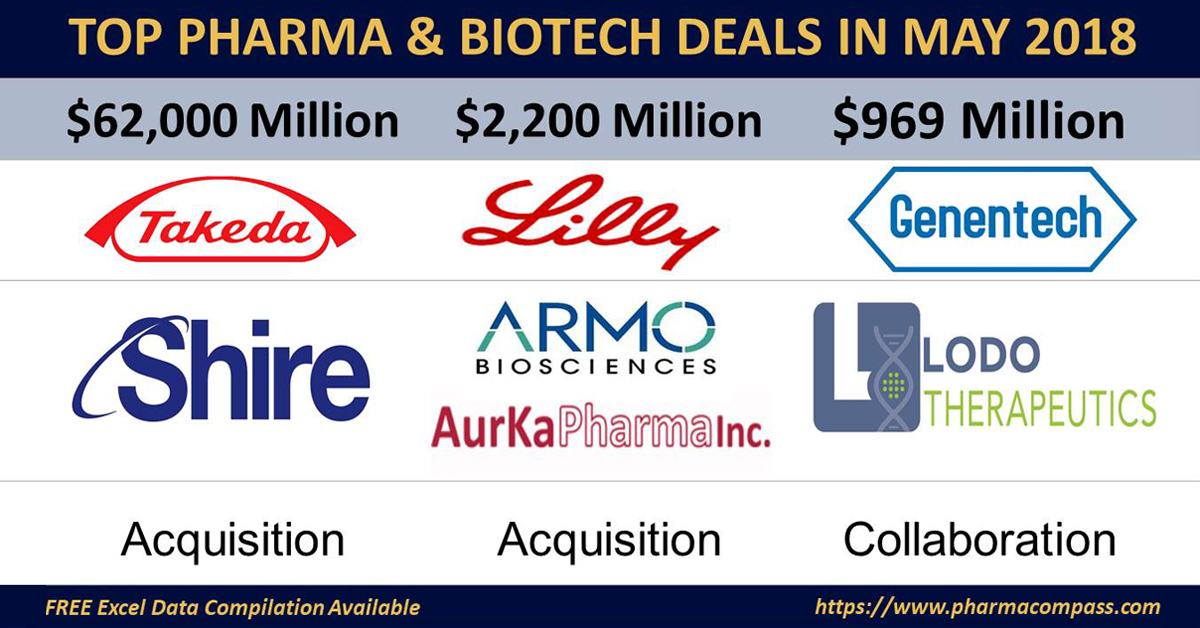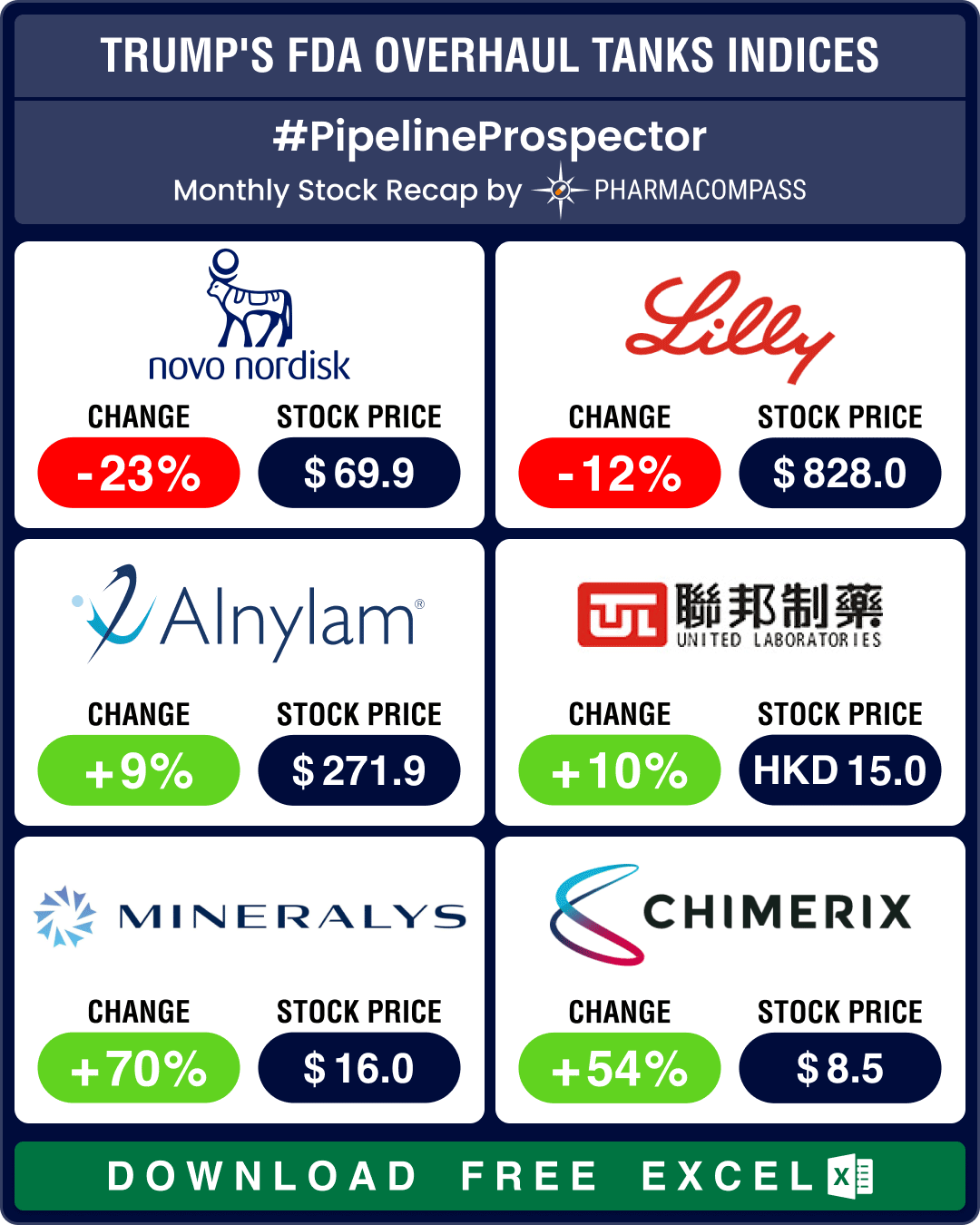
By PharmaCompass
2018-06-14
Impressions: 2826
As April 2018 breezed past with news of Novartis’ US$ 8.7 billion buyout of AveXis, May set the temperatures soaring with one of the largest pharma acquisitions in recent years.
Japanese drugmaker Takeda Pharmaceutical agreed to buy British drugmaker Shire for US$ 62 billion (£45.3 billion) in the biggest pharma M&A deal of the year.
In a month that witnessed extensive deal making, Eli Lilly announced its commitment to spend over US$ 2.2 billion to acquire immuno-oncology companies — ARMO Biosciences and AurKa Pharma, while Genentech signed a deal worth US$ 969 million with Lodo Therapeutics to discover novel molecules with therapeutic potential against multiple disease-related targets of interest to Genentech.
AstraZeneca was also busy last month as it expanded its collaboration with the UK-based Bicycle Therapeutics by signing a wide-ranging deal to develop novel small molecule medicines for respiratory, cardiovascular and metabolic diseases.
Will Takeda-Shire’s US$ 62 billion deal go through?
Japanese drug maker Takeda Pharmaceutical Limited clinched Ireland-based Shire for a hefty price tag of US$ 62 billion (£46 billion). Together, they have almost made it to the league of the 10 largest drug companies.
Takeda’s first non-Japanese CEO, Christophe Weber, envisions the new entity as a global pharmaceutical giant with its roots in Japan, along with becoming a leader in gastroenterology, neuroscience, oncology and rare diseases.
The transaction has been approved by the boards of both the companies. It is expected to close in the first half of 2019.
Click here to view the major deals in May 2018 (FREE Excel version available)
Upon closing of the transaction, Takeda shareholders will own approximately 50 percent of the combined group.
However, Takeda’s board faces stiff opposition from a group of shareholders who say the buyout will shrink the value of Takeda’s shares.
The small groupof Takeda shareholders comprising the drug maker’s ex-employees has achieved sizable support in its opposition to the company’s deal.
This 130-member group comprising ex-Takeda employees holds one percent of the drug maker’s shares and needs to secure a third of shareholder votes. The group also includes members of the founding Takeda family which holds about 10 percent of Takeda shares, as reported on Nikkan Yakugyo, a Japanese daily.
Click here to view the major deals in May 2018 (FREE Excel version available)
Reuters reported earlier this week that Takeda “will hold the shareholder meeting later this year or early next year to approve an issue of new stock to help fund the Shire deal, making it a de facto vote on the deal itself.”
This rebel group of shareholders is “working steadily to increase support” for blocking the deal among domestic retail investors and overseas institutional investors who own 25 percent and 35 percent of Takeda shares respectively, Reuters noted.
Last year, this shareholder group had tried preventing the appointment of outgoing Chairman Yasuchika Hasegawa to an advisory position at the company. The proposal stood defeated at the company’s annual general meeting then, since it had gained only 30.5 percent of votes.
Click here to view the major deals in May 2018 (FREE Excel version available)
After discovering
drugs from soil, Lodo rakes in almost US$ 1 billion from Genentech
Lodo Therapeutics Corporation, a drug discovery and development company focused on identifying bioactive natural compounds directly from soil bacteria, announced it had formed a strategic drug discovery collaboration with Genentech, a member of the Roche Group.
The Genentech collaboration has Lodo receiving an undisclosed upfront payment and becoming eligible to receive research, development and commercialization milestone payments of up to US$ 969 million.
In addition, Lodo is eligible to receive tiered-royalties on sales of certain products resulting from the collaboration.
Click here to view the major deals in May 2018 (FREE Excel version available)
Two months before the Genentech deal was announced, Lodo published its discovery of a new class of antibiotics called “malacidins” in the journal Nature Microbiology.
Malacidins, discovered from soil, attack an essential part of the bacterial cell wall in a unique way compared to other existing calcium-dependent antibiotics. They annihilate several bacterial diseases that are resistant to most existing antibiotics, including the superbug MRSA.
Click here to view the major deals in May 2018 (FREE Excel version available)
Experts say this approach offers fresh hope in the antibiotics arms race and may be able to reduce the time and cost of drug discovery.
Dr Sean Brady's team at New York’s Rockefeller University — the researcher whose vision inspired the founding of Lodo Therapeutics — has devised a gene sequencing technique that can analyze more than 1,000 soil samples which became the basis for the company’s genome mining platform.
Click here to view the major deals in May 2018 (FREE Excel version available)
Eli Lilly strengthens its oncology portfolio as it goes on a buying spree
Eli Lilly announced it was bolstering its immuno-oncology portfolio by acquiring ARMO BioSciences for US$ 1.6 billion in cash — just a few months after ARMO’s successful IPO debut on Nasdaq.
This US$ 1.6 billion transaction brings to Lilly’s table ARMO’s lead immuno-oncology asset, pegilodecakin, which is being studied in multiple tumor types.
Click here to view the major deals in May 2018 (FREE Excel version available)
While pegilodecakin is a valuable phase 3 asset, the reason for the billion-dollar price tag is its potential use in combination treatments with Merck’s Keytruda and BMS’ Opdivo.
The successful combination of pegilodecakin with Keytruda and Opdivo can potentially expand the blockbuster market for the drugs by turning non-responders into responders.
ARMO has tested pegilodecakin in combination with both Keytruda and Opdivo, but could combine it with its own anti-PD-1 antibody in the long term.
Click here to view the major deals in May 2018 (FREE Excel version available)
The biotech bagged US$ 67 million in August to bankroll the pegilodecakin program, and to move its anti-PD-1 antibody into the clinic.
An Evaluate Pharma report, published a year ago, examined the explosion in the number of clinical trials using anti-PD-1 and anti-PD-L1 antibodies combined with other therapeutic approaches. The report states that the number of combined use clinical trials had shot up from 215 to 765.
Just four days after the US$ 1.6 billion all-cash transaction, Lilly announced it is paying US$ 110 million upfront and another US$ 465 million in milestones to buy Montreal-based AurKa Pharma.
Click here to view the major deals in May 2018 (FREE Excel version available)
At the center of this deal is AK-01, an Aurora kinase A inhibitor that Lilly discovered years ago, which was sold off to TVM Capital Life Science in 2016. Aurora A kinase is a master regulator of mitotic progression, and disrupting it can play a role in preventing tumor progression through various pathways. As such it now fits Lilly’s sweet spot and the cancer team wants it back in their pipeline.
Click here to view the major deals in May 2018 (FREE Excel version available)
AstraZeneca expands collaboration with UK-based Bicycle Therapeutics
Last month, AstraZeneca and Cambridge-based Bicycle Therapeutics announced they have expanded their 2016 collaboration to develop a novel class of small molecule medicines for treating respiratory, cardiovascular and metabolic diseases.
The companies said the alliance could be worth more than US$ 1 billion for Bicycle, if all planned programs reach the market.
Bicycle Therapeutics is focused on identifying Bicycles, the company’s proprietary bicyclic peptides that resemble injectable antibody drugs. These are essentially small molecules that possibly can be given as pills.
Click here to view the major deals in May 2018 (FREE Excel version available)
The company states on its website — ‘Bicycles address therapeutic needs unreachable with any other existing modality’. Their small size and exquisite tumor targeting quality delivers rapid tumor penetration and retention while clearance rates and routes can be tuned to minimize exposure of healthy tissue and toxicities.
Our view
While the drug pricing debate continues to rage on in the United States, Evaluate Pharma recently published its World Drug Forecast report which predicts that prescription drug sales will grow to US$ 1.2 trillion in 2024 at a compound annual growth rate of 6.4 percent over the next seven years.
Recently, the Gates Foundation opened its not-for-profit venture and French companies like Servier and Ipsen announced the launch of their operations in Boston. Being a pharma hub with small startups, large drug makers, incubator sites and large-biotech focused research institutes, we expect more deals to take place in Boston over the coming months, especially post the BIO convention.
PharmaCompass’ compilation of Top Pharma & Biotech Deals — PharmaFlow — is your way of keeping track of all that is happening.
Click here to view the major deals in May 2018 (FREE Excel version available)
The PharmaCompass Newsletter – Sign Up, Stay Ahead
Feedback, help us to improve. Click here
Image Credit : Top Pharma and Biotech Deals in May 2018 by PharmaCompass is licensed under CC BY 2.0
“ The article is based on the information available in public and which the author believes to be true. The author is not disseminating any information, which the author believes or knows, is confidential or in conflict with the privacy of any person. The views expressed or information supplied through this article is mere opinion and observation of the author. The author does not intend to defame, insult or, cause loss or damage to anyone, in any manner, through this article.”








